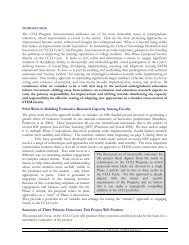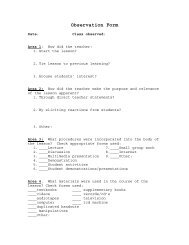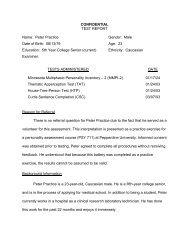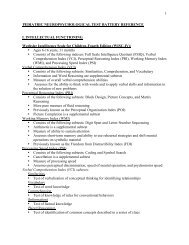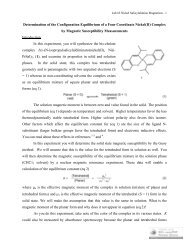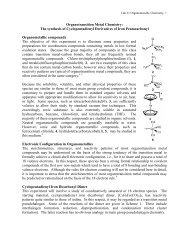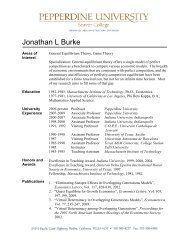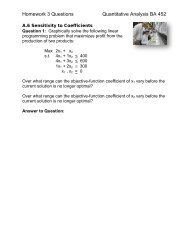The Right to Migrate, According to Catholic Social Thought
The Right to Migrate, According to Catholic Social Thought
The Right to Migrate, According to Catholic Social Thought
- No tags were found...
Create successful ePaper yourself
Turn your PDF publications into a flip-book with our unique Google optimized e-Paper software.
ZENITZE04032002 - 2004-03-20Permalink: http://www.zenit.org/article-17470?l=english<strong>The</strong> <strong>Right</strong> <strong>to</strong> <strong>Migrate</strong>, <strong>According</strong> <strong>to</strong> <strong>Catholic</strong> <strong>Social</strong><strong>Thought</strong>Andrew Yuengert on the Common Good of ImmigrationMALIBU, California, MARCH 20, 2004 (Zenit.org).- <strong>The</strong> issue of immigration has made headlines in theUnited States since President George Bush proposed a new policy for temporary workers.But how does immigration play out in <strong>Catholic</strong> social thought? Andrew Yuengert -- an associate professor andthe John and Francis Duggan Professor of economics at Seaver College at Pepperdine University -- sharedwith ZENIT that the right <strong>to</strong> immigrate is not absolute.It is, however, an important reminder of the dignity of those affected by national policies and is a componen<strong>to</strong>f the universal common good, he said.Q: Why does the use of "rights" language transform the nature of the immigration debate?Yuengert: <strong>The</strong> word "rights" is often the last thing that those who are angry about immigration want <strong>to</strong> hear.Americans often misunderstand what the popes mean when they claim that there is a right <strong>to</strong> migrate.In our culture, rights claims are made in an absolute way -- rights are often invoked as a way of ending debate,unless someone else claims a competing right, in which case nothing is resolved and everyone feels aggrieved.In contrast, a rights claim in <strong>Catholic</strong> thought is a reminder of the dignity of those affected by our policies.<strong>Right</strong>s claims are meant <strong>to</strong> begin debates, not <strong>to</strong> end them, and <strong>to</strong> orient those debates <strong>to</strong>ward the real humangoods at stake in policy deliberations.Thus, claims about the rights of migrants are an encouragement <strong>to</strong> take in<strong>to</strong> account the very real benefits ofimmigration <strong>to</strong> immigrants themselves -- not <strong>to</strong> construct policy solely on the basis of its effects on citizens.Q: What does it mean that there is a right <strong>to</strong> migrate, and why does the right exist? How is it connected <strong>to</strong> thedignity of the human person?Yuengert: As I said above, rights language is meant <strong>to</strong> remind us <strong>to</strong> take in<strong>to</strong> account the effect of our policieson immigrants, as well as on our own people.We can discover this right by reflecting on what is involved in the migration decision. Emigration is rarelyundertaken lightly. <strong>The</strong>re are real losses associated with it: loss of local culture, loss of family connections,and vulnerability <strong>to</strong> exploitation in a new labor market and culture.An immigrant is a human being taking a difficult, often risky step in pursuit of his own development. His veryact of migrating proclaims that these goods are important <strong>to</strong> him and his family, and are at risk if he does not<strong>The</strong> <strong>Right</strong> <strong>to</strong> <strong>Migrate</strong>, <strong>According</strong> <strong>to</strong> <strong>Catholic</strong> <strong>Social</strong> <strong>Thought</strong> 1
ZENITmigrate.A person who is moving across national boundaries in pursuit of his family's well-being, his own education,or perhaps fleeing direct physical danger, has a claim on our solicitude for the dignity he expresses in hisdecision.Q: In what ways is the right <strong>to</strong> migrate connected <strong>to</strong> the basic principles of <strong>Catholic</strong> social thought known assubsidiarity and solidarity?Yuengert: <strong>The</strong> principles of solidarity and subsidiarity safeguard the common good of immigration.<strong>The</strong> ability <strong>to</strong> move across national boundaries in pursuit of a better life is a component of the universalcommon good. Even if most people never become immigrants, the existence of the option is a real humangood that benefits families and countries, through greater economic opportunity and the enriching of culturesthrough their interaction.This international common good does not fall within the boundaries of any one country, however, and as aresult no country is responsible for guaranteeing the right <strong>to</strong> migrate.Since there is no international body that has authority <strong>to</strong> safeguard the free movement of people acrossnational boundaries, nations are on their honor, so <strong>to</strong> speak, <strong>to</strong> safeguard this right.Solidarity in immigration is a firm commitment <strong>to</strong> this right -- it encourages us <strong>to</strong> see in the immigrant asanother person, whose dignity is at stake in our policy deliberations and who has no one <strong>to</strong> speak for him as aperson if we do not.<strong>The</strong> principle of subsidiarity demands that the immigration policies of local communities -- in this case, nationstates -- be respected by international organizations.<strong>The</strong>se two principles provide the necessary balance needed <strong>to</strong> make immigration policy. Solidarity discoversin the humanity of immigrants the right <strong>to</strong> migrate; subsidiarity respects the just prerogatives of the nation,which must balance the good of its own citizens against the real benefits <strong>to</strong> immigrants.Q: Does <strong>Catholic</strong> social teaching favor unrestricted migration? Shouldn't states have the right <strong>to</strong> reasonablycontrol their own borders, especially in light of national security concerns?Yuengert: <strong>The</strong> right <strong>to</strong> migrate is not absolute. It is like the right <strong>to</strong> property, which may be abridged in certainsituations, but not like the right <strong>to</strong> life, which may never be abridged.When immigration threatens other rights -- the right of a people <strong>to</strong> basic security, for example -- it may berestricted in light of those other rights. Like the right <strong>to</strong> property, though, the right <strong>to</strong> migrate should not beabridged lightly, since it restricts a fundamental human good -- the initiative of the immigrant in promotinghis own or his family's well-being.Many have made use of legitimate security concerns <strong>to</strong> advocate restrictions on legal immigration. Ifimmigration were the principal threat <strong>to</strong> U.S. national security, this would be a good argument for restrictingit. Immigration is not, however, the primary threat <strong>to</strong> our security.<strong>The</strong> biggest threat is the disorder at the Immigration and Naturalization Service. We do not do a good job ofscreening legal immigrants for terrorists when they enter the United States and we do not keep track of themafterward.<strong>The</strong> <strong>Right</strong> <strong>to</strong> <strong>Migrate</strong>, <strong>According</strong> <strong>to</strong> <strong>Catholic</strong> <strong>Social</strong> <strong>Thought</strong> 2
ZENITIf we kept better tabs on immigrants, we would not worry so much about their numbers. If we restrict thenumber of legal immigrants, there will be more illegal immigrants, whom we do not track at all. <strong>The</strong>n aterrorist will simply attempt <strong>to</strong> enter the country illegally, or as one of the 35 million temporary visi<strong>to</strong>rs <strong>to</strong> theUnited States each year.Q: Many conservative critics of open migration policies fear that mass migration will lead <strong>to</strong> culturalbreakdown, rising poverty and crime. Are these fears unfounded?Yuengert: A hundred years ago, the same fears were expressed about the Jewish and <strong>Catholic</strong> immigrantsfrom southern and eastern Europe: <strong>The</strong>y would not assimilate, they were a public burden, they wereundemocratic and they were potentially disloyal. Today our culture includes Italian, Jewish, Greek and Polishinfluences and is none the worse for it.Are the new immigrants that different from the old? <strong>The</strong>y are hardworking, eager <strong>to</strong> succeed, and stillattached <strong>to</strong> their home countries and ways of life. To tell the truth, given the state of U.S. culture, a largeinflux of devoutly religious immigrants might be a blessing.Because many immigrants are poor, they do raise our poverty rate. This puts a real strain on our generoussocial safety net, particularly in the states and localities where immigrants concentrate, and has resulted inappropriate restrictions on immigrant access <strong>to</strong> welfare.<strong>The</strong>se costs would not be so large if they were spread evenly across the country. A good case can be made forfederal help for those states and localities most burdened by providing social services for immigrants.Immigrants do not raise our crime rate. Almost all of them are here <strong>to</strong> work, not <strong>to</strong> steal. <strong>The</strong> children of poorimmigrants are at somewhat greater risk of crime, but this is not different than the risk of anyone who growsup poor.Q: Are there tangible economic benefits <strong>to</strong> an open migration policy?Yuengert: <strong>The</strong> benefits <strong>to</strong> immigration are similar <strong>to</strong> the benefits of free trade: <strong>The</strong> United States can take fulladvantage of its economic strengths - high-tech goods and services -- without having <strong>to</strong> give up on goodsmade with less skilled labor.<strong>The</strong> benefits are distributed unevenly, though, and the costs are born by those U.S. workers who competedirectly with immigrants for jobs.Unskilled wages have fallen slightly due <strong>to</strong> immigration; this decline, though small, is troubling, even thoughit is a result of a huge benefit conferred on immigrants themselves, who sometimes experience a fivefoldincrease in earnings.Although immigrants impose large fiscal burdens on the handful of states in which they cluster, they are a netbenefit <strong>to</strong> the federal government. Because they are young, they will help <strong>to</strong> pay the government's bills whenthe baby boomers retire, through their contributions <strong>to</strong> <strong>Social</strong> Security and Medicare.Q: Are states morally obligated <strong>to</strong> accept migrant workers? If so, how can their interests be balanced with thenative population and the common good?Yuengert: <strong>The</strong> second question captures the state's moral obligation. It is obligated <strong>to</strong> balance the interests ofimmigrants with its national common good. Although Pope John Paul II encourages developed nations <strong>to</strong> be<strong>The</strong> <strong>Right</strong> <strong>to</strong> <strong>Migrate</strong>, <strong>According</strong> <strong>to</strong> <strong>Catholic</strong> <strong>Social</strong> <strong>Thought</strong> 3
generous, he does not offer specific advice beyond his exhortations.<strong>The</strong> actual balancing of interests requires the virtue of prudence -- it is a difficult decision, requiring respectfor the dignity of immigrant and native alike.<strong>The</strong> Pope is concerned that nations do not even attempt <strong>to</strong> balance their own interests and those ofimmigrants, but treat the inconveniences of immigration as in<strong>to</strong>lerable costs and ignore completely thesubstantial benefits of immigration <strong>to</strong> immigrants.Q: Should immigrants be "naturalized" both culturally and linguistically, or should native populations work <strong>to</strong>respect migrant cultures and not encourage them <strong>to</strong> assimilate?Yuengert: <strong>The</strong> assumption in Pope John Paul II's writings is that immigrants will assimilate. By immigrating,they join a new community, with a new common good. <strong>The</strong> right <strong>to</strong> migrate implies certain duties on the par<strong>to</strong>f immigrants: Learn the local language, pay taxes, be a good member of your local community and obey thelaw.This last obligation makes illegal immigration problematic, since it involves the immigrant in a contradiction:<strong>The</strong> very act of immigration is a violation of the laws of the community the immigrant joins. Any time there isa law that is regularly flouted without consequence, respect for all law is put at risk.<strong>The</strong>re are two remedies for this problem. <strong>The</strong> first is akin <strong>to</strong> the repeal of Prohibition: the restrictions ofimmigration law are <strong>to</strong>o great a burden for potential immigrants. Immigrants seeking a better life immigrate indefiance of this law, putting respect for all law at risk, so the restrictions should be eased.<strong>The</strong> second remedy is <strong>to</strong> enforce the current law more vigorously. This may require more stringent measuresthan we are currently willing <strong>to</strong> impose: enforcing heavy penalties for employers who employ illegalimmigrants, expedited deportation and extended detention of illegal immigrants while the wheels of dueprocess turn.| MoreZENIT© Innovative Media, Inc.Reprinting ZENIT's articles requires written permission from the edi<strong>to</strong>r.<strong>The</strong> <strong>Right</strong> <strong>to</strong> <strong>Migrate</strong>, <strong>According</strong> <strong>to</strong> <strong>Catholic</strong> <strong>Social</strong> <strong>Thought</strong> 4



